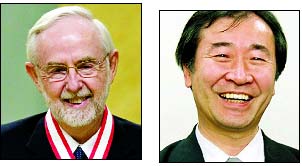
Mail Online.com :
The Nobel Prize for Physics has been awarded to two scientists for their work on helping to reveal how mysterious subatomic particles called neutrinos can change their identity.
Professor Takaaki Kajita, a physicist from the University of Tokyo, Japan and Professor Arthur McDonald, from Queen’s University in Kingston, Canada, were awarded the prize for the ‘discovery of neutrino oscillations’. Their work has proved to be crucial in demonstrating that neutrinos, which are high energy subatomic particles, have mass. After being told about winning the prize, the pair paid tribute to the other scientists they had worked with that made their work possible. The Royal Swedish Academy of Sciences said the two researchers’ work has ‘changed our understanding of the innermost workings of matter and can prove crucial to our view of the universe’.
The pair’s discovery showed that neutrinos can switch between different ‘flavours’ – electron, muon, and tau, – as they travel through space.
Professor Kajita first made the discovery that neutrons from the Earth’s atmosphere switch between two identifies, or flavours’ using the Super-Kamiokande detector in Japan in 2000.
Meanwhile Professor McDonald’s group in Canada also demonstrated that a discrepancy between the number neutrinos detected in the sun’s core failing to match those reaching the Earth was due to them ‘disappearing’. Instead he showed they were taking on a different identity. A statement released by the Royal Swedish Academy of Sciences said: ‘The discovery led to the far-reaching conclusion that neutrinos, which for a long time were considered massless, must have some mass, however small. ‘For particle physics this was a historic discovery. Its Standard Model of the innermost workings of matter had been incredibly successful, having resisted all experimental challenges for more than twenty years. ‘However, as it requires neutrinos to be massless, the new observations had clearly showed that the Standard Model cannot be the complete theory of the fundamental constituents of the universe.’
After photons – the particles of light – neutrinos are thought to be the most numerous in the entire universe. Although the Earth – and everything on it – is constantly bombarded by them, they rarely interact with matter, instead passing straight through the planet. Thousands of billions of neutrinos are streaming through our bodies each second. On the rare occasions they do interact with other matter, they produce bright flashes of energy.
In order to detect these elusive particles, and to unravel their source, scientists have been building giant detectors filled with water or in the ice of the Antarctic to look for these rare flashes of light.
Many neutrinos are created in reactions between cosmic radiation and the Earth’s atmosphere. Others are produced in nuclear reactions inside the Sun. After hearing he had won the prize, Professor Kajita, 56, who is the director of the Institute for Cosmic Ray Research at the University of Tokyo, said: ‘When I received the phone call I was checking my email. It was really a surprise to me. It is kind of unbelievable.
‘I have maybe dreamed of this but never seriously thought it would happen.’ Professor McDonald, 72, said he ‘gave his wife a hug’ after being woken at 5am to be told he had won the prize.
He said: ‘I received a phonecall shortly after 5am my time and was awoken to wonderful news. It was very surprising but very gratifying as well.’ He went on to pay tribute to his colleagues who helped him conduct the research. He said: ‘It is a very daunting experience. Fortunately I have many colleagues who share this prize with me and the tremendous amount of work they have done to accomplish this measurement.
‘We have a very friendly collaboration between scientists from Canada, US and Portugal. This group gives me a group of people with whom I can enjoy the moment.’
Speaking about the discovery which won him the prize, Professor McDonald added: ‘There was certainly a eureka moment when were able to see that neutrinos were able to change from one type to another when travelling from the sun to the earth. ‘Neutrinos are among the fundamental particles that do not know how to subdivide any further. Their position in the models of physics at the most fundamental level are very important. ‘They also have significant implications for how the universe has involved and knowing if they are massive and whether they change their type are fundamental in helping us unravel these mysteries as well.’ He added that he had ‘many positive collaborations’ with Professor Kajita and his team. The two winners will split the 8 million Swedish kronor (about $960,000) prize money. Each winner also gets a diploma and a gold medal at the prize ceremony on 10 December.
On Monday the Nobel Prize in medicine went to scientists from Japan, the U.S. and China who discovered drugs that are now used to fight malaria and other tropical diseases. The prize announcements continue with chemistry on Wednesday, literature on Thursday, the Nobel Peace Prize on Friday and the economics award next Monday.
Reacting to the announcement of the physics prize, Professor John Butterworth, a particle physicist at University College London, said: ‘The discovery of neutrino oscillations is the only definite “Beyond the Standard Model” physics discovery to have happened during my career. ‘The discovery opened up a whole field of neutrino physics which is still producing amazing science.’

